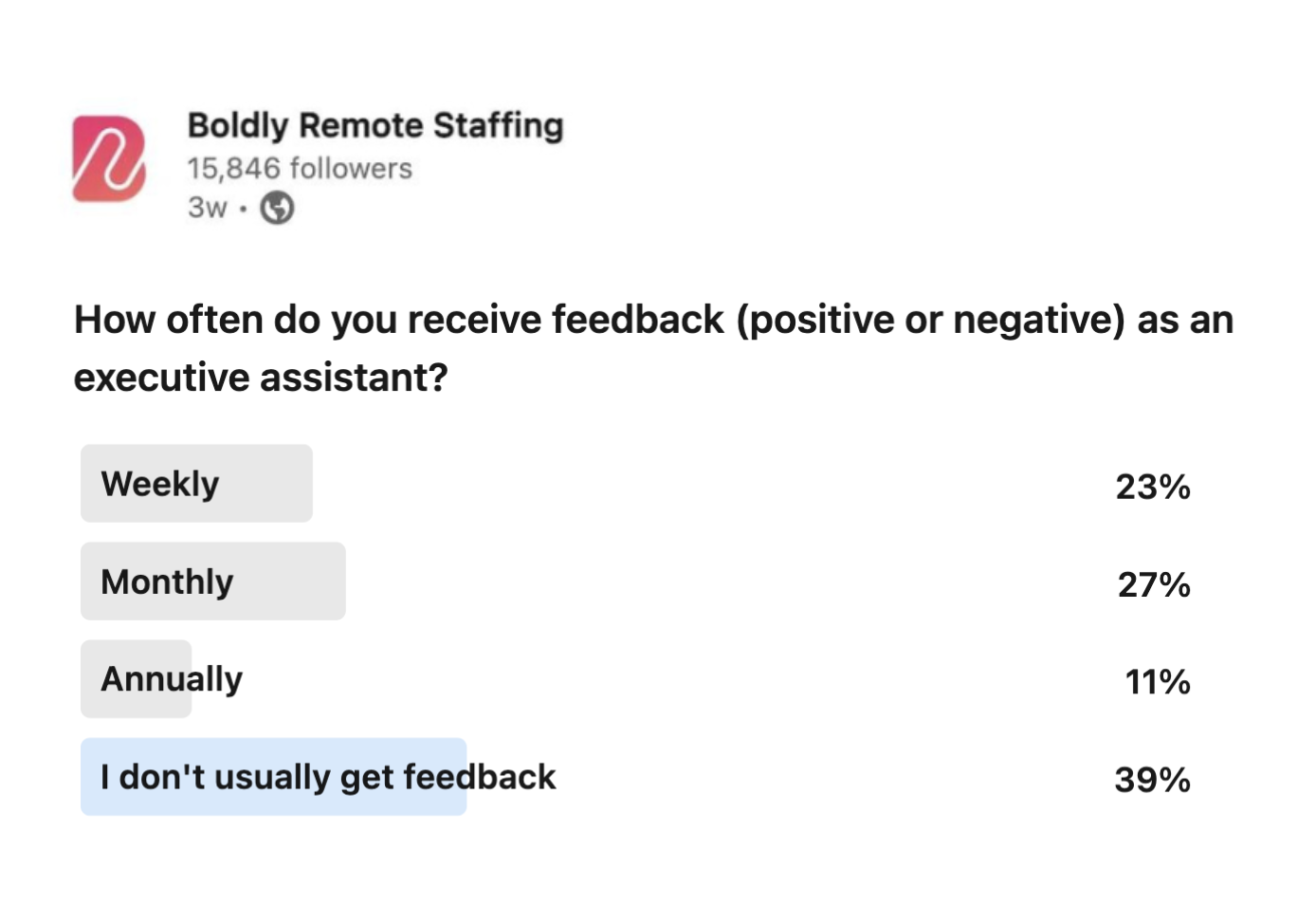Most companies have annual executive assistant performance reviews.
But if you’re waiting a full year before giving feedback, you’re missing out on one of the easiest ways to keep your team and EA fully engaged in doing their best work.


The trouble is, with a full schedule and high-pressure deadlines, this habit is easy to overlook.
Giving regular, meaningful feedback to your team is the difference maker. However, a Gallup study found only 16% of workers reported receiving meaningful feedback in the last week.
It just takes 10 minutes to provide solid feedback for your executive assistant — whether it’s to point out something that could be going better or to appreciate something they’re already doing really well.
How To Give Feedback To Your Executive Assistant
Whether things are going smoothly or you need to have a challenging conversation, here are five tips for giving meaningful, constructive, and helpful feedback to your executive assistant.
- Be specific and timely: When giving feedback, be specific and clear about what you appreciate or what needs improvement. Provide examples and address the situation as soon as possible to ensure clarity and relevance.
- Encourage open communication and collaboration: Create an environment where your EA feels comfortable sharing their thoughts and concerns. You can create a space for open communication by actively listening and asking for their perspective and input. Have they noticed the same things? What do they need for change to happen?
- Set clear expectations: Clearly set your expectations regarding tasks, deadlines, and quality standards. Clarity helps your EA understand what is expected of them and decreases miscommunication.
- Offer guidance and resources: If your executive assistant is struggling with a certain task, offer your support and any resources you have. This shows that you are invested in their growth and development.
- Recognize and appreciate their efforts: Show your EA that you appreciate their work! Take time to thank them for their role! It will boost their confidence so they can keep growing.
Now that we’ve looked at the feedback tips from 10,000 feet let’s go a bit deeper so your conversations can run smoother.
Establish And Maintain A Good Feedback Routine With Your Assistant
Once your executive assistant is up and running, it’s tempting to start skipping your regular check-ins and let things go on autopilot. But this is where things often start to break down.
The meeting with your executive assistant is one of the most important things on your calendar — after all, they’re going to be scheduling your meetings, managing your inbox, and communicating on your behalf. Your ability to move forward on key things is directly tied to your assistant’s ability to keep things moving behind the scenes.
Maintaining open lines of communication ensures your priorities are aligned and any issues can be addressed head-on.
Read more: 5 Keys To Revolutionize How You Work With An Executive Assistant
Whether it’s virtually or in person, the meeting doesn’t have to be long but it should be at the top of your list.
This empowers your EA to perform their duties more effectively and strengthens the bond of trust and communication that forms the backbone of your partnership.
Giving Feedback When Things Get Bumpy
Miscommunication happens. And the simplest approach starts with you — get clarity and keep composure.
Rather than focusing only on what went wrong, ask your executive assistant how they understood the task.
- Maybe the instructions weren’t clear
- Maybe the deadline wasn’t included
- Maybe they felt like another task was the priority based on something that was said
- Or maybe they dropped the ball entirely by accident!
Leading with this two-way approach will help clarify each person’s point of view and pave the way for clearer communication in the future.
In these moments, your goal is to provide balanced feedback that acknowledges the effort they put in to understand and complete the task.
Specifics are important—outline what could have been done differently but also highlight parts that were managed well. Specific and kind feedback can be a learning tool, rather than direct criticism.
As Boldly Team Leader Angie shares below, kindness doesn’t mean blanket positivity or “beating around the bush.” Kind feedback is direct, to the point, and comments on the mistake rather than the person. It’s working together to find how you can both learn and grow.
Your aim here is to correct — not criticize — while understanding that mistakes can be an opportunity for growth and learning.
Detailing Tasks For Your Executive Assistant
You can’t glide past every mistake but laying out details ahead of time for each task can help stop errors before they happen.
Before your EA begins a task, discuss document accuracy, calendar management, and the importance of quick responses. You may even want to build out a “reference library” that documents your personal preferences, how recurring tasks should be handled, and other key information that can reduce errors.
This is especially important when working with a remote executive assistant or virtual assistant who might not be working in the same office you are.
Ensuring that your executive assistant has the information and tools they need to be effective can show that you’re invested in their success as well as their growth. Empowering them to work smarter, not harder.
Praising Effort & Skill
Recognizing the work your EA puts in can go a long way! It reinforces the value your executive assistant brings to the job each day.
Their determination and skillset are the gears that keep operations smooth, and your words should mirror this importance.
Note their “wins” as they happen. For example, take a moment to celebrate if they scheduled a meeting before you asked.
By showing how much you see their growth, you can boost their motivation and confirm they are doing well.
If words are not your thing, even a simple “well done” can go a long way in affirming your assistant’s skill and effort.
Offering Constructive Task Tips
A good rule of thumb here is to have a conversation, not a monologue, when discussing task performance.
Encourage your EA to share their perspective first and propose solutions. A collaborative environment built on a foundation of trust is a productive environment. This approach promotes ownership of the tasks and allows them room to innovate.
Your feedback should be given:
- As soon as possible, while the task is fresh
- With examples if possible
Highlight what they did well then give some tips that will make the next task run smoother.
Feedback Doesn’t Have To Be Overly Formal
Millennials and Gen-Z in the workplace prefer authentic and real-time feedback. Instead of confining feedback to formal reviews, integrate it into your regular interactions. This creates a comfortable space for back-and-forth communication.
Regular, informal touchpoints keep the lines of communication wide open. These moments can be as simple as a brief check-in via Zoom after lunch. It may seem simple, but even a brief check-in reveals the value you see in their work and your commitment to their professional development.
Along with informal check-ins, scheduling team syncs every week can keep production moving in the right direction.
Leave Each Conversation With Confidence
Amazing feedback skills will not happen overnight. However, the good news is that rockstar assistants already have the training and knowledge to work with C-Suite executives.
In fact, one of the best things about working with premium executive assistants at Boldly is that our team already receives regular feedback and support from their Team Leader. Which means you can focus on strategic initiatives and the big picture — our team takes care of the rest!




